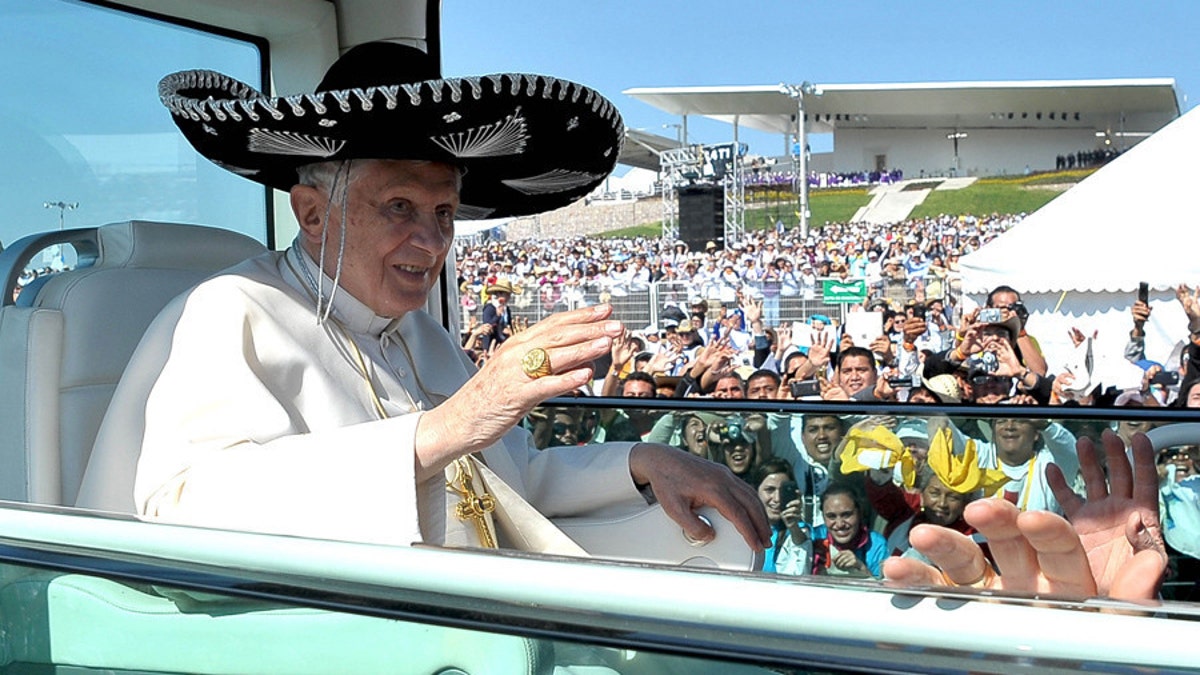
MEXICO CITY – Nearly a year ago, Pope Benedict XVI donned a large and festive black sombrero as he was greeted by enthusiastic crowds on his first trip to Mexico.
“Mexico will always remain in my heart,” the pointiff told revelers. Already a devout Catholic country, the pope’s warm words were like icing on the cake for Mexicans. But now the country is still reeling from surprising news the 85-year-old pope made on Monday in announcing his resignation.
"Pope Benedicto XVI has always been a friend of Mexico," President Enrique Peña Nieto announced on Twitter yesterday, offering the pope "solidarity and respect from the government of Mexico."
Catholics across Mexico were shocked by the news. Benedict XVI is the first pope to resign in 600 years.
"Popes traditionally never get sick. They get a cold or they die is the saying," said Elio Masferrar Kan, anthropology professor at the National School of Anthropology and History in Mexico City and president of the Latin American Association for Religious Studies.
"People are used to seeing the agony of the popes — Pope John Paul II for example. But it's very uncommon to see them resign," Masferrar added.
But along with shock, hopes are high in Mexico that the College of Cardinals will look to Latin America when choosing Benedict's successor. Top names so far include include Odilo Scherer, Archbishop of Sao Paulo, Brazil, and Cardinal Leonardo Sandri of Argentina.
With millions of followers, recognized saints and no other leading national than the ubiquitous Virgen of Guadalupe, there’s nothing more Mexicans would like than to see one of their own get a chance to assume the highest role in the Catholic Church
Keep hoping, Masferrar said — and remain patient.
"The Mexican Catholic Church has few notable intellectuals," he said. "They are very few and they are marginalized by their own hierarchy."
In fact, the Catholic Church in Mexico faces a much larger problem than having a good potential farm system for future pope candidates — many of them are actually leaving traditional Catholicism and instead flocking to evangelical Protestantism.
And yet others are leaving religion altogether — at least partly due , whether in light of pedophile scandals or other reasons.
In 1970, 96 percent of Mexicans identified as Catholic. Today, according to the National Institute of Statistics and Geography, it's 83 percent of the population — still a significant majority, but not an overwhelming one.
But while evangelical Protestants are rapidly gaining strength and numbers — their churches multiplying across the country — Masferrar said they remain virtually invisible in the Mexican media.
Tuesday morning, images of Pope Benedict XVI dominated the front pages of leading Mexican newspapers, but not all the analyses were favorable.
Fran Ruiz wrote in La Cronica de Hoy that history will remember John Paul XXIII for modernizing the church, John Paul I for his death shortly after assuming the post, John Paul II for his world travels and charisma, and Benedict XVI for … his resignation.
"For better or worse, this is how posterity will remember that German theologian and intellectual who never intended to revolutionize the Church nor adapt to the reality of the twenty-first century," wrote Ruiz.
"Almost eight years ago, when he accepted the papacy, Benedict XVI had two very tough tasks ahead: To stem the flow of Catholics renouncing their religion, and to purify the Church of sin that was criminally and shamefully hidden for decades," he continued, then concluded:
"He failed in both."
Others were more forgiving. Religion analyst Bernardo Barranco of the Center for Religious Studies in Mexico told El Universal: "Many claim that his resignation will cause commotion and crisis in the life of the church, but I think the equation is precisely the opposite — that the crisis of the church has led to an abdication of the pope."
Whether or not the new pope hails from Latin America, he may find himself visiting Mexico — greeted with another big sombrero.
And if he does, Bishop José Raul Vera López, an outspoken critic of Mexico's violence and human rights issues, said he hopes the new pope addresses government and financial corruption in Mexico and defends the rights of the poor.
Vera, who was nominated for a Nobel Peace Prize in 2012, says it's not just violence plaguing the country, but a crisis of ethics among political elites and businessmen — many whom are church-going Catholics.
"In Mexico right now there's a lot of suffering, a lot of victims. And this happens because [those that have the] economic and political power are not doing anything for poor people. They are abusing them," Vera told Fox News Latino.
The Church needs to bear witness, said Vera, and the next pope "needs to defend their rights."
